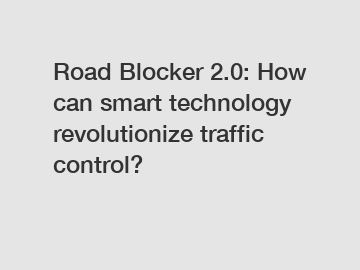Road Blocker 2.0: How can smart technology revolutionize traffic control?
Road Blocker 2.0: How can smart technology revolutionize traffic control?
Traffic congestion has become one of the major challenges that cities around the world are facing. It not only causes frustration and stress for commuters but also leads to significant economic losses. To overcome this issue, the use of smart technology has emerged as a promising solution. Smart technology, when integrated with traffic control systems, has the potential to revolutionize the way we manage traffic. In this article, we will explore how smart technology can address this problem by reducing congestions, optimizing traffic flow, and enhancing safety.
The need for an advanced traffic control system stems from the ever-increasing number of vehicles on the road. Traditional traffic control methods like traffic signals and street signs are no longer efficient in managing the growing traffic volume. Smart technology, on the other hand, offers a dynamic and adaptable solution.

One of the key features of smart technology in traffic control is the use of real-time data. In the past, traffic control relied on historical data and pre-determined timing of signals. However, with the advancements in technology, we now have the capability to collect real-time data from various sources such as cameras, sensors, and GPS. This data provides instant information about traffic patterns, allowing traffic control systems to dynamically adjust signal timings and optimize traffic flow.
Furthermore, smart technology enables the integration of different modes of transportation. In today's urban landscape, multiple modes of transportation coexist, including private vehicles, public transportation, shared mobility services, and bicycles. The seamless integration of these modes through smart technology can help reduce congestion and promote a more sustainable transport network. For example, smart traffic control systems can prioritize buses by giving them longer green lights when they are behind schedule, encouraging more people to opt for public transportation.
Another significant benefit of smart technology in traffic control is the enhancement of safety. Intelligent algorithms can analyze real-time data to identify potential hazards and take preventive measures. For instance, if a vehicle is running a red light or traveling above the speed limit, the system can automatically trigger an alert or activate traffic barriers to prevent accidents.
The impact of smart technology on traffic control goes beyond mere optimization. By reducing congestion and enhancing safety, it leads to a more efficient transportation network that benefits both residents and businesses. Commuters can enjoy reduced travel times and improved air quality, while businesses can optimize their logistics operations with more predictable delivery schedules.
In conclusion, smart technology has the potential to revolutionize traffic control by reducing congestion, optimizing traffic flow, and enhancing safety. Real-time data, seamless integration of transportation modes, and intelligent algorithms are the key components that contribute to its effectiveness. The adoption of smart technology in traffic control will undoubtedly bring significant benefits to cities, improving the quality of life for its residents and paving the way for a sustainable urban future.
If you are looking for more details, kindly visit Crash Rated Road Blocker, Iwa Milita Fixed Bollards supplier, ZASP.

Comments
0